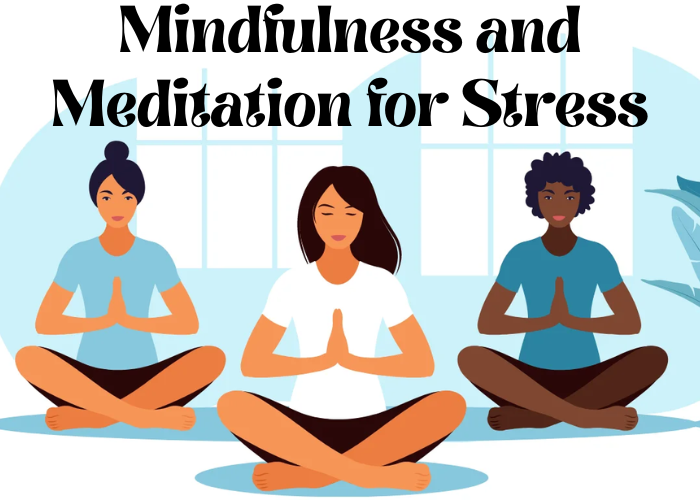Are you trying to manage stress in your life? Have you ever considered mindfulness and meditation as an effective tool for managing stress? If not, it’s time to take a closer look. Mindfulness and meditation can offer powerful benefits that can help us make positive changes in our lives by allowing us to learn how to reduce stress, increase focus, foster peace of mind and even improve our health. In this blog post, we will explore the various advantages of practicing mindfulness and meditation for better stress management. We’ll also consider the ways it can be incorporated into daily life so that anyone can find relief from their day-to-day stresses.
What Is Mindfulness and Meditation
The practice of mindfulness and meditation has become increasingly popular in recent years, as its benefits for stress management have become more widely recognized. The fundamental concept behind these techniques is to focus the individual’s attention on the present moment and to become aware of all aspects of the experience without judging it negatively. This idea can be beneficial during times when an individual is feeling overwhelmed or stressed out by their thoughts, as it gives them an opportunity to take a step back and refocus without getting caught up in a spiral of negativity. The advantages of mindfulness and meditation also include empowering an individual to better manage their reactions during high-pressure situations, allowing them to take control over their situation and respond calmly with greater clarity and effectiveness.
How Do They Help to Reduce Stress Levels
The practice of mindfulness and meditation can have significant impacts on reducing stress levels. For starters, these practices help people become better attuned to their emotions and thoughts, allowing one to more effectively manage the stressful elements of life. Additionally, mindfulness and meditation give people the ability to respond more calmly to challenging situations rather than becoming reactive. The reduction in physiological effects that have been linked to stress such as elevated heart rate and reduced cognitive ability also suggest that mindfulness and meditation might be viable options for stress management. The advantages of mindfulness and meditation for successful stress management are clear, and those individuals who utilize these techniques often return with greater emotional intelligence, control, resilience, and overall well-being.
The Benefits of Mindfulness and Meditation for Stress Management
Mindfulness and meditation are powerful tools for managing stress. Studies show that incorporating these practices into daily life can help lower feelings of stress, frustration, and irritability. Mindfulness involves being present in the moment, consciously observing what is happening while staying nonjudgmental. Meditation encourages relaxation and can bring greater clarity to our thoughts and emotions. Practicing mindfulness regularly encourages us to take critical steps to lessen our reactions to stress, leading us to an overall sense of calm. Through our increased awareness, we can develop strategies to cope with difficult situations and make decisions more effectively. With practice, mindfulness and meditation offer invaluable benefits, providing us with resilience and helping us better manage stress.
How to Get Started With Mindfulness and Meditation
Mindfulness and meditation are powerful tools for improving focus and creating greater self-awareness. To start using these techniques, begin by carving out a few minutes each day to create a quiet space for yourself. Sit comfortably in a calm place without too many distractions and close your eyes. Allow your thoughts to move through your mind without judging or reacting. Pay attention to how the products of your wandering feelings manifest in your body and let them go without reactivity or control. As you become more comfortable with this practice, expand it to become a daily ritual of around ten minutes. Keeping up this practice will open you up to deeper levels of relaxation and well-being.
The Importance of a Healthy Mind-Body Balance for Reducing Stress Levels
Achieving a healthy mind-body balance is essential for reducing stress levels. Being able to slow down, focus on the present moment, and relax physical tension can help promote better mental health. Furthermore, neglecting physical aspects of our daily lives such as sleep or nutrition can take a toll on both the mind and body over time, exacerbating stress. It’s important to maintain a healthy diet and ensure that your body gets adequate rest each day in order to keep your mind-body balanced. Relaxation techniques like yoga or meditation, having an active hobby, or simply taking regular breaks are also excellent strategies for controlling stress levels. When we treat our bodies with tender loving care and take deliberate steps towards achieving a relaxed state of being, we can create improved mind-body balance and lower stress exponentially.
Conclusion
Stress is a commonplace emotion in today’s society. Though it is often seen as negative, stress can also be a motivator. However, when unmanaged, stress can have detrimental effects on our physical and mental health. This is where mindfulness and meditation come in; both have been shown to be effective stress management tools. Mindfulness allows us to become more aware of our thoughts and feelings so that we can better manage them, while meditation provides us with a sense of calm amidst the chaos of everyday life. If you’re looking for a way to reduce your stress levels, give mindfulness and meditation a try – you might just find that they make all the difference.



